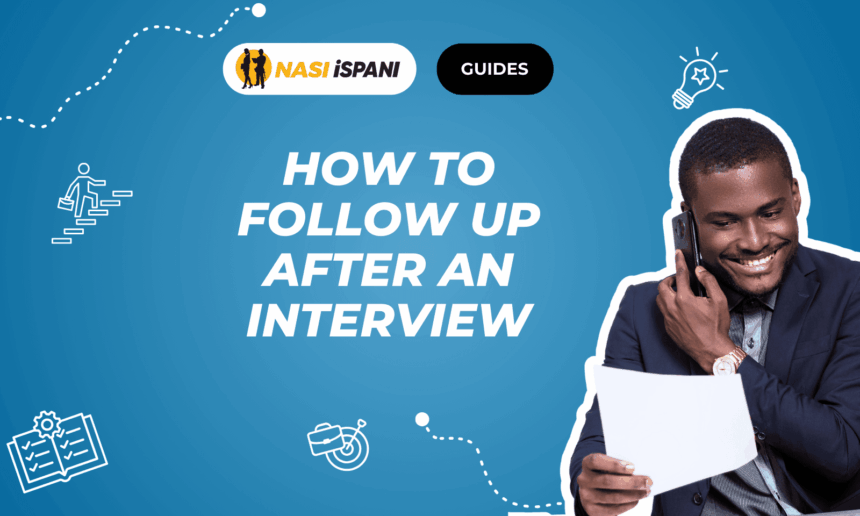Job interviews are a crucial part of the hiring process, allowing candidates to showcase their skills, experience, and personality. However, securing the job offer doesn’t always end with the interview. A well-timed and thoughtful follow-up can leave a lasting impression on hiring managers and may set you apart from other candidates.
If you’re wondering how to follow up after an interview to boost your chances of success, this guide will provide you with step-by-step advice, tips, and best practices to follow.
The Importance of Following Up After an Interview
Following up after an interview is more than just a polite gesture; it’s a powerful tool that can help you stay top of mind for the employer. Here are some reasons why it’s essential to follow up:
- Shows Enthusiasm: A timely follow-up demonstrates your genuine interest in the position and the company.
- Reaffirms Qualifications: It gives you a chance to reiterate why you are the best candidate for the job.
- Clarifies Any Doubts: If there was a part of the interview where you feel you didn’t explain yourself well, following up gives you an opportunity to address it.
- Professional Courtesy: It shows that you respect the employer’s time and appreciate the opportunity to interview.
By following up correctly, you can reinforce the positive impression you made during the interview and increase your chances of getting hired.
The Key Steps to Take After an Interview
Now that you understand the importance of following up, let’s walk through the best practices for doing so.
1. Send a Thank-You Email within 24 Hours
The most important follow-up action you should take is sending a thank-you email. Aim to send it within 24 hours after the interview. This is your opportunity to express your gratitude and appreciation for the interviewer’s time.
Here’s what your thank-you email should include:
- Personalization: Start by thanking the person who interviewed you by name and mention something specific you discussed during the interview. This shows that you were actively engaged and attentive.
- Reaffirm Your Interest: Reiterate your enthusiasm for the role and the company. Mention why you are excited about the opportunity to contribute to their team.
- Highlight Your Strengths: Use the email as a chance to briefly remind the interviewer why you are the perfect fit for the job. You can mention a key skill or experience that aligns with the company’s needs.
- Professional and Polite Tone: Keep your email concise, polite, and free of any spelling or grammatical errors.
Example of a Thank-You Email:
Subject: Thank You for the Interview Opportunity
Dear [Interviewer’s Name],
Thank you so much for taking the time to meet with me yesterday regarding the [Job Title] position at [Company Name]. I truly enjoyed learning more about the team and the exciting projects you are working on.
After our conversation, I am even more enthusiastic about the opportunity to contribute my skills in [specific area of expertise] to your team. I believe my experience with [relevant skill or achievement] will allow me to make a positive impact at [Company Name].
Once again, thank you for considering my application. I look forward to hearing from you soon.
Best regards,
[Your Name]
2. Follow Up If You Haven’t Heard Back
If the interview was successful but you haven’t heard anything after a week or two, it’s okay to send a polite follow-up email to check on the status of your application. Be sure to express your continued interest and ask for any updates on the hiring process.
It’s important to be patient, as hiring decisions can take time. However, following up in a respectful and professional manner shows your commitment.
Example of a Follow-Up Email:
Subject: Follow-Up on Interview for [Job Title] Position
Dear [Interviewer’s Name],
I hope this email finds you well. I wanted to follow up regarding my interview for the [Job Title] position on [Interview Date]. I remain very interested in the opportunity to contribute to [Company Name] and would love to know if there have been any updates on the hiring process.
Thank you once again for your time and consideration. I look forward to hearing from you soon.
Best regards,
[Your Name]
Learn More: Effective Strategies for Following Up After a Job Interview
3. Send a Thank-You Note (Optional)
In some cases, sending a handwritten thank-you note can make a positive impression. This can be especially effective for roles in industries that value personal touches and relationships. While emails are more common, a well-crafted handwritten note can show extra effort and thoughtfulness.
A handwritten note should be sent the same day as your email, or the next business day at the latest.
Handwritten Thank-You Note Example:
Dear [Interviewer’s Name],
I wanted to take a moment to thank you for the opportunity to interview for the [Job Title] position at [Company Name]. I really enjoyed speaking with you and learning more about the exciting work you’re doing. I’m very excited about the possibility of contributing to your team.
I appreciate your time and consideration. Thank you again, and I look forward to hearing from you.
Warm regards,
[Your Name]
4. Be Mindful of Timing
Timing is everything when it comes to following up. Sending a thank-you email too soon or too late can have an impact on how your follow-up is perceived. Follow these timing guidelines:
- Thank-You Email: Always send your thank-you email within 24 hours of the interview. This shows that you are prompt and respectful of the interviewer’s time.
- Follow-Up Email: If you haven’t heard anything in a week or two, send a follow-up email. Wait at least 7 to 10 days after your last communication before reaching out again.
Be careful not to send multiple follow-up emails within a short period. Patience is important, and sending frequent follow-ups could be seen as desperate or pushy.
5. What If You’re Rejected?
If you receive a rejection after an interview, it’s still a good idea to send a thank-you email. Express your appreciation for the opportunity and show your interest in staying in touch for future opportunities.
Here’s a simple example of how to reply to a rejection:
Subject: Thank You for the Opportunity
Dear [Interviewer’s Name],
Thank you for informing me about your decision, and I appreciate the opportunity to interview for the [Job Title] position at [Company Name]. While I’m disappointed I wasn’t selected, I remain enthusiastic about your company and the work you’re doing.
I would love to stay in touch for any future opportunities that may arise. Please feel free to reach out if anything changes.
Thank you again, and I wish you and your team continued success.
Best regards,
[Your Name]
6. What Not to Do When You Follow Up After an Interview
While it’s important to follow up, it’s equally crucial to avoid certain mistakes that can hurt your chances of getting the job:
- Don’t Be Pushy: Don’t send too many follow-up emails or contact the interviewer excessively. Once is enough unless otherwise requested.
- Avoid Using a Generic Message: Tailor your follow-up to each interview. Avoid sending a generic thank-you message to multiple companies.
- Don’t Sound Desperate: Keep your tone professional and enthusiastic, but avoid sounding desperate for the job.
Related: Effective Job Interview Strategies: What to Say and What Not to Say
Following up after an interview is a critical step in your job search journey. It shows professionalism, reinforces your interest in the position, and gives you a chance to further impress the employer. By sending a timely thank-you email, following up appropriately, and being mindful of timing, you can significantly increase your chances of securing the job.
Remember, a well-crafted follow-up can make the difference between being remembered positively or forgotten altogether. So, make sure to follow the tips outlined in this guide, and don’t miss out on an opportunity to land your dream job.



